2024 Acura Integra Type S Review and Test Drive
A slightly more civilized way to satisfy your need for speed.
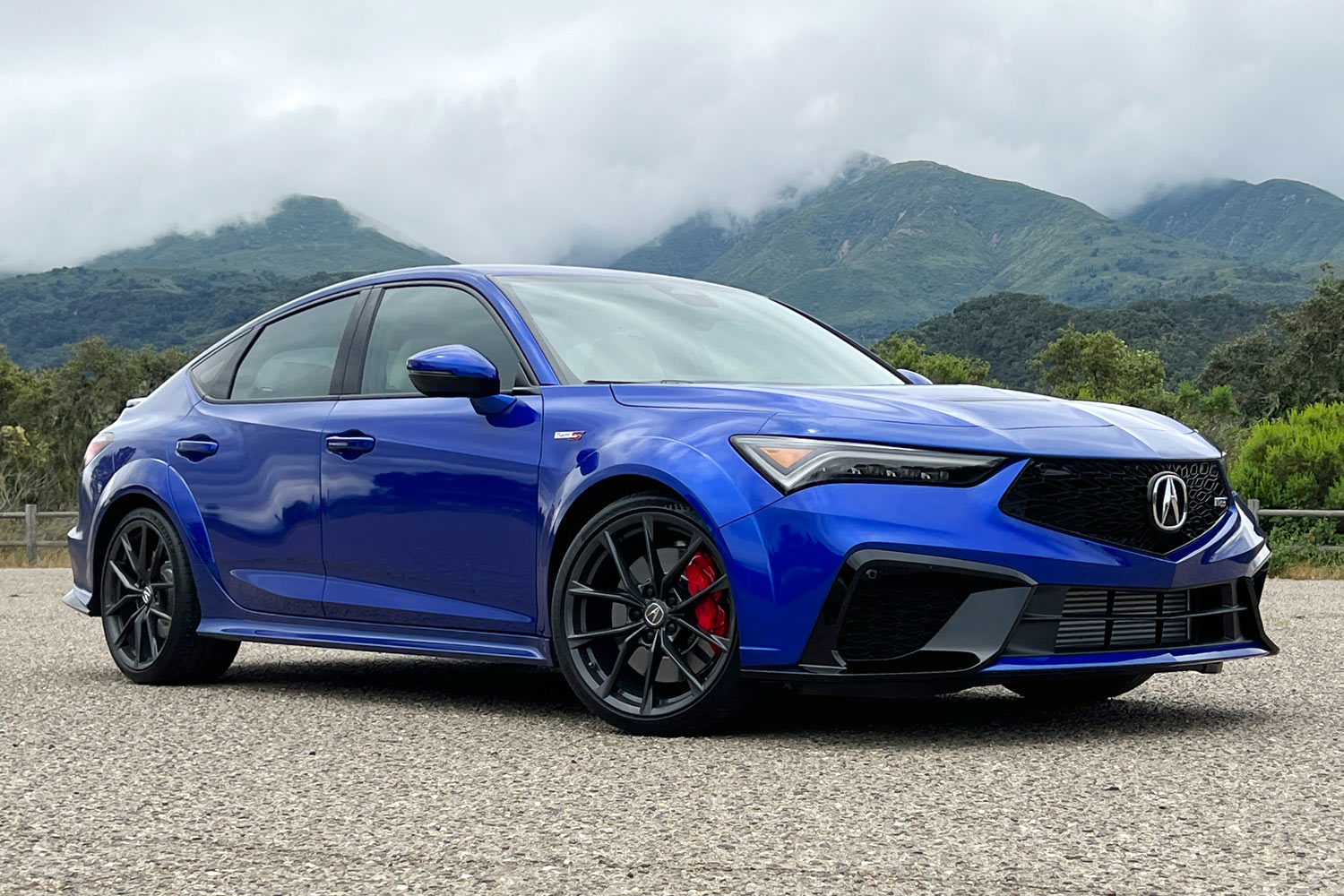 Christian Wardlaw
Christian Wardlaw
The Integra is as integral to Acura as peanut butter is to Reese's. It served as one of two foundational models when Acura launched in 1986, and the first-generation Integra three-door and five-door hatchbacks quickly found an audience seeking a practical and reliable compact car with upscale style and rewarding driving dynamics.
Peak Integra arrived in the form of the third-generation Type R, and in 2002, the Integra nameplate disappeared, replaced by the one-and-done RSX model.
Say what you want about alphanumeric naming strategies, but let's cut to the chase. In 2023, Acura returned the Integra to its rightful position as the entry-level car in the company's lineup. Now, the 2024 Acura Integra Type S arrives with a significant performance boost and extra visual attitude.
Acura has used the Type S designation for more than 20 years, and it signals more power, better braking, and superior handling. The Integra Type S pulls many mechanical parts from the Honda Civic Type R component bin. However, with dynamic tuning specific to the Acura, a greater emphasis on comfort, and a more upscale look and feel, the Integra Type S is a slightly more civilized pocket rocket.
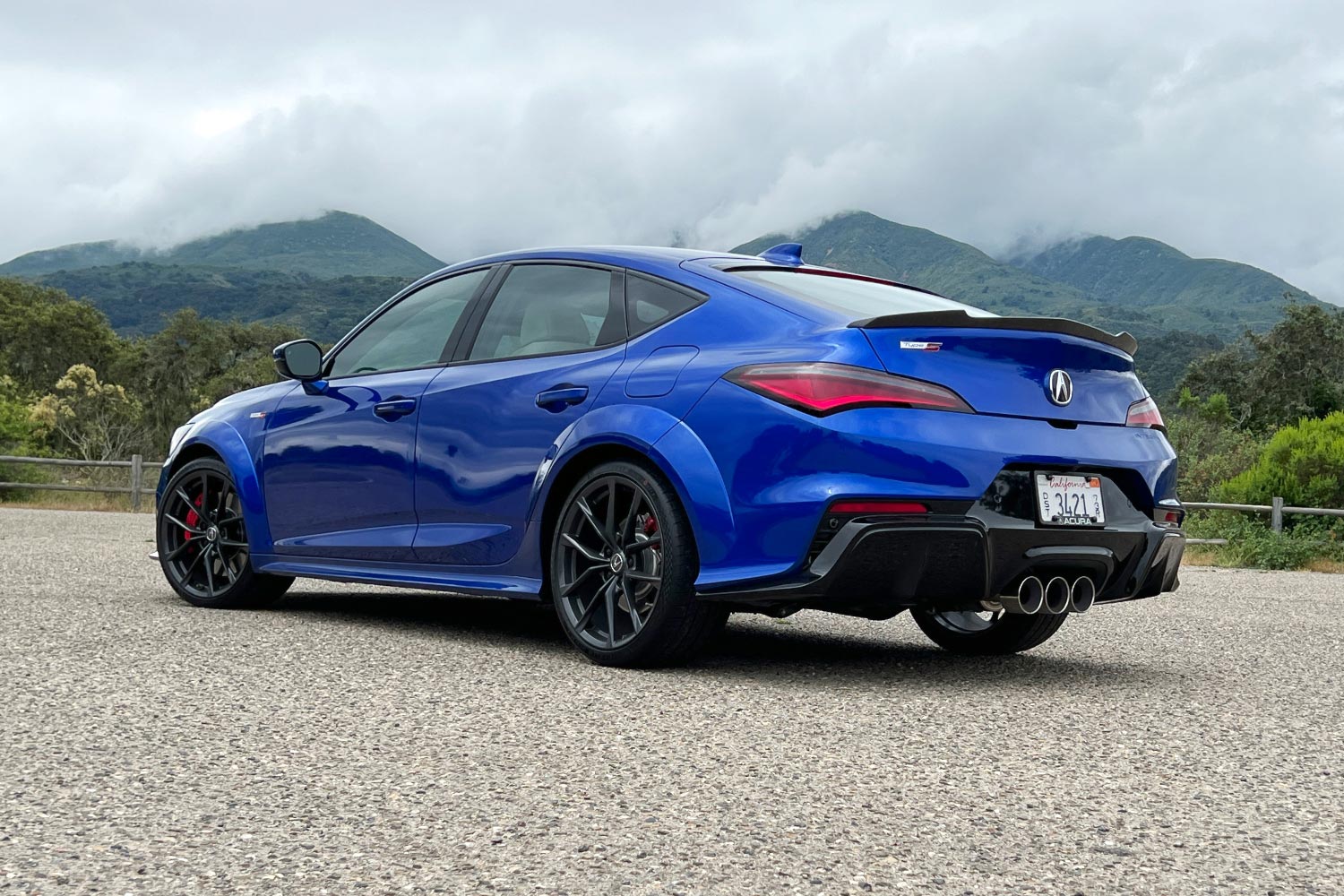 Christian Wardlaw
Christian Wardlaw
The more boisterous Civic Type R could siphon sales from the Acura. In my opinion, it's more likely that people who wouldn't consider the Type R due to the rear wing planted on its stubby rear, glaringly red interior, and the stiff ride will find the new Integra Type S appealing.
In addition, with the Integra Type S, Acura now has a carrot to entice driving enthusiasts who might be shopping for an Alfa Romeo Giulia, Audi S3, BMW M235i xDrive Gran Coupe, Cadillac CT4-V, Genesis G70 3.3T, Lexus IS 350 F Sport, and Mercedes-AMG CLA 35. But here's the thing: They'd better know how to drive a stick because the Acura comes only with a six-speed manual transmission.
The 2024 Acura Type S comes in a single level of specification, with a base price starting in the low $50,000s, which is higher than many of the models listed above. That estimate includes the destination charge to ship the car from the Marysville, Ohio, factory to your local dealership.
For this Acura Integra Type S review, I test-drove one with extra-cost Apex Blue paint, a premium carpeted floor mat set, and a carbon-fiber rear spoiler, bringing the manufacturer's suggested retail price to $53,785, including the $1,195 destination charge. Acura provided the vehicle for this Integra Type S review and paid for lodging and meals during the evaluation, which took place in Southern California.
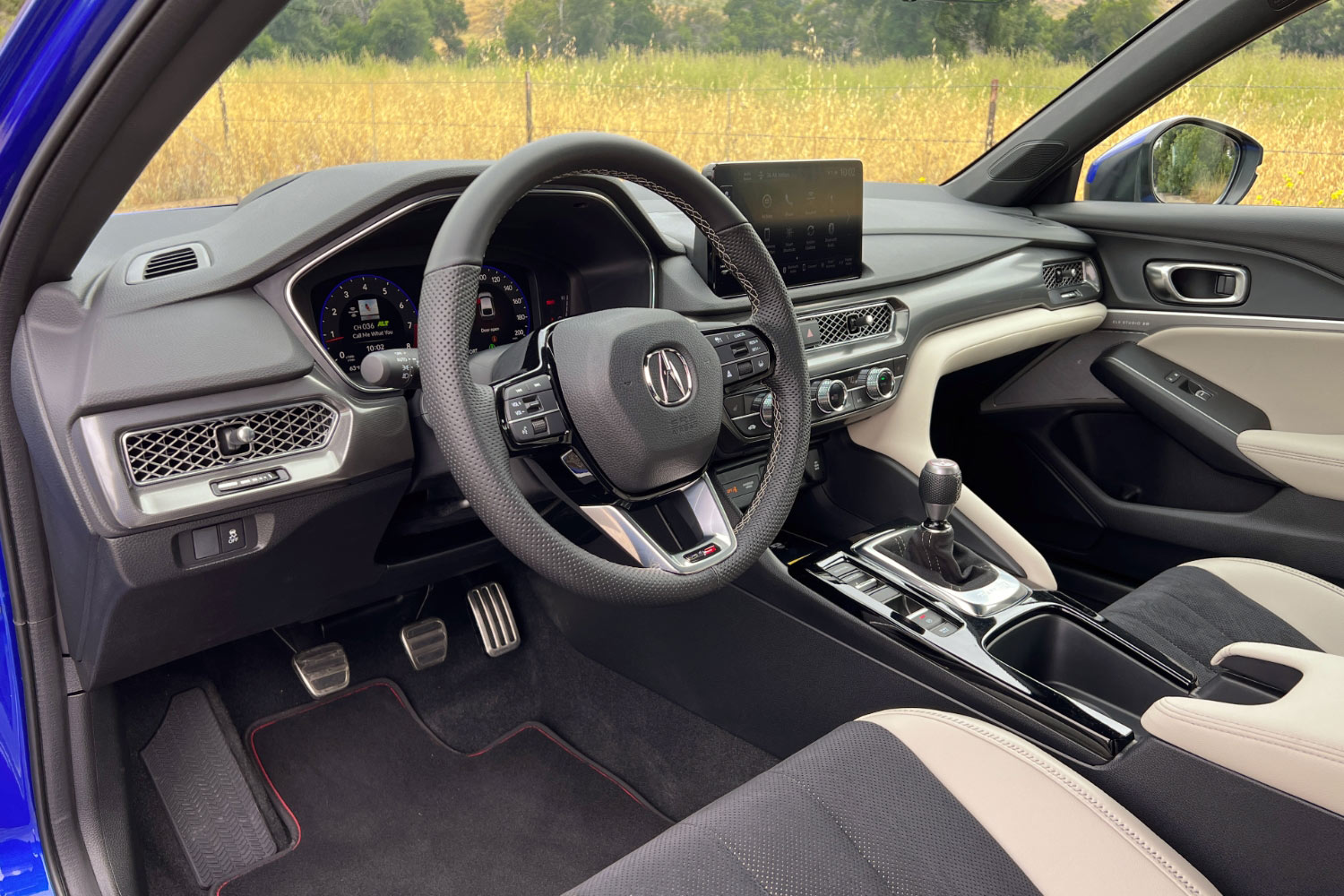 Christian Wardlaw
Christian Wardlaw
2024 Acura Integra Type S a Refined Version of a Certain Honda
You can see the difference between a Type S and a standard-issue Integra with no more than a glance. Acura redesigned the Type S from the windshield forward to accommodate the mechanical goodies that make it such an unmitigated blast to drive.
With bodywork up to 2.8 inches wider than other Integras and front and rear track widths that grow 3.5 inches and 1.9 inches respectively, the Type S looks like Dodge got a hold of it and added a Widebody treatment. The fender flares, lower body kit, and 9.5-inch wide 19-inch wheels in a standard Shark Gray or available Gloss Copper finish dramatically alter the Integra Type S's stance, and the car sits more than an inch closer to the ground.
In addition, the Integra Type S gets a unique grille pattern to improve airflow and engine cooling, larger lower fascia air inlets to feed the engine's intercooler and to cool the front brakes, and a vented aluminum hood to reduce aerodynamic lift. You'll find a tasteful lip spoiler and a sizable rear diffuser panel punched through with a triple-outlet exhaust system in the back.
Inside, the changes are less noticeable. With the Red and Orchid interior colors, a trim piece on the front passenger's side of the dashboard matches the seat bolsters and door panel trim, and Acura sprinkles Type S logos about the cabin. The seats have an exclusive design with added bolstering and perforated Ultrasuede inserts, the shifter boot is suede, and the anodized shift knob features a red pattern.
Drivers enjoy a 12-way power-adjustable seat, and both front seats are heated. I put nearly 170 miles on the Integra Type S, and the driver's seat remained comfortable. However, this Acura's cornering grip exceeds the ability of the seatback bolsters to hold you securely in place behind the steering wheel. Also, the four-way, manually adjustable front passenger seat needs a manual height adjuster, especially since the Type S sits close to the ground.
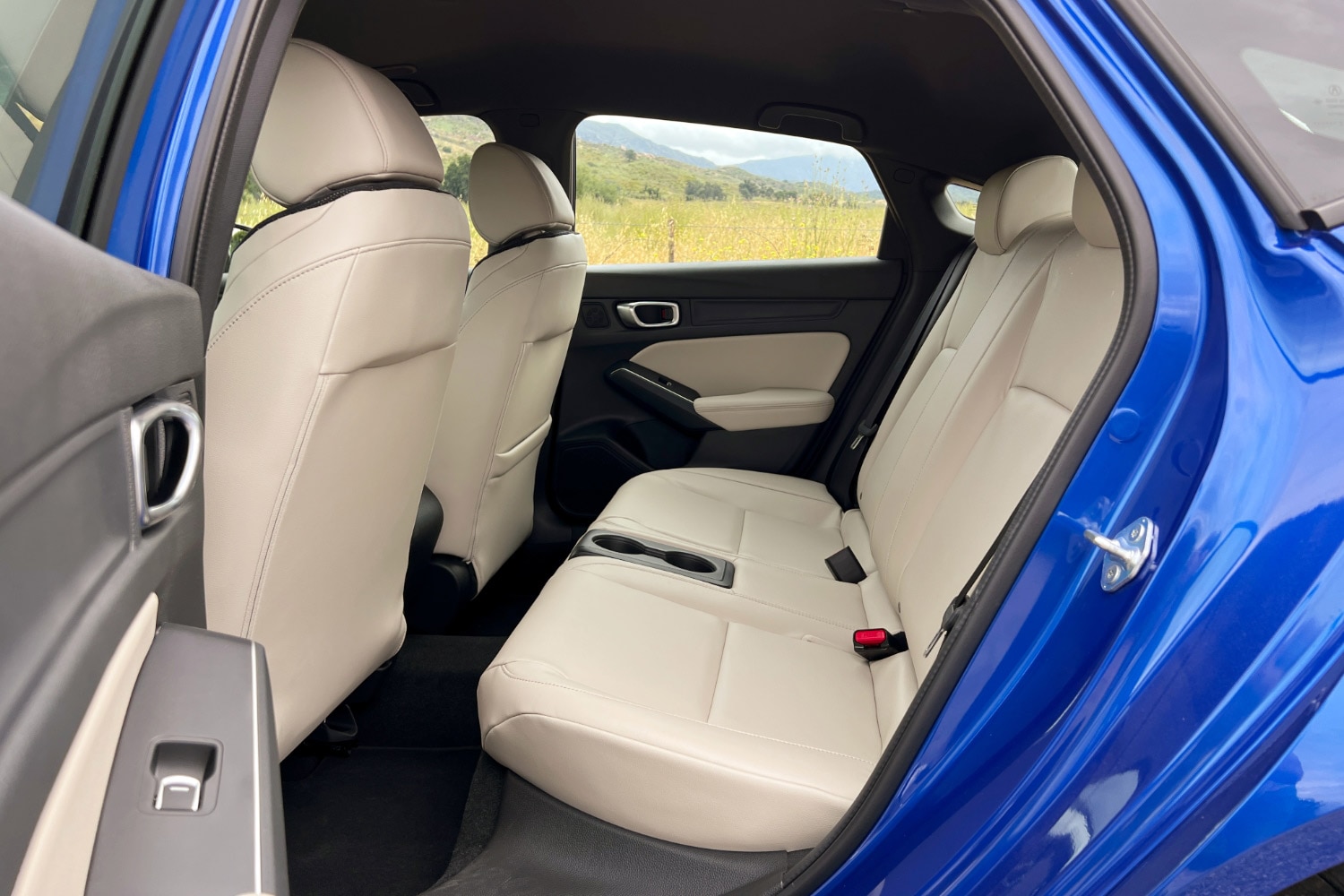 Christian Wardlaw
Christian Wardlaw
Four people can ride in the Integra Type S. The back seat has cupholders between the two outboard seats, but passengers will do without air conditioning vents and USB charging ports. I hit my head on the roof while getting in, but the Type S provides decent legroom and foot room, and the softly padded front seatbacks are kind to knees and shins. Unfortunately, the bottom cushion lacks thigh support, so the backrest angle promotes a slouched position. Also, the hard-plastic upper door panel surfaces are hard to reconcile with the Integra Type S's price tag.
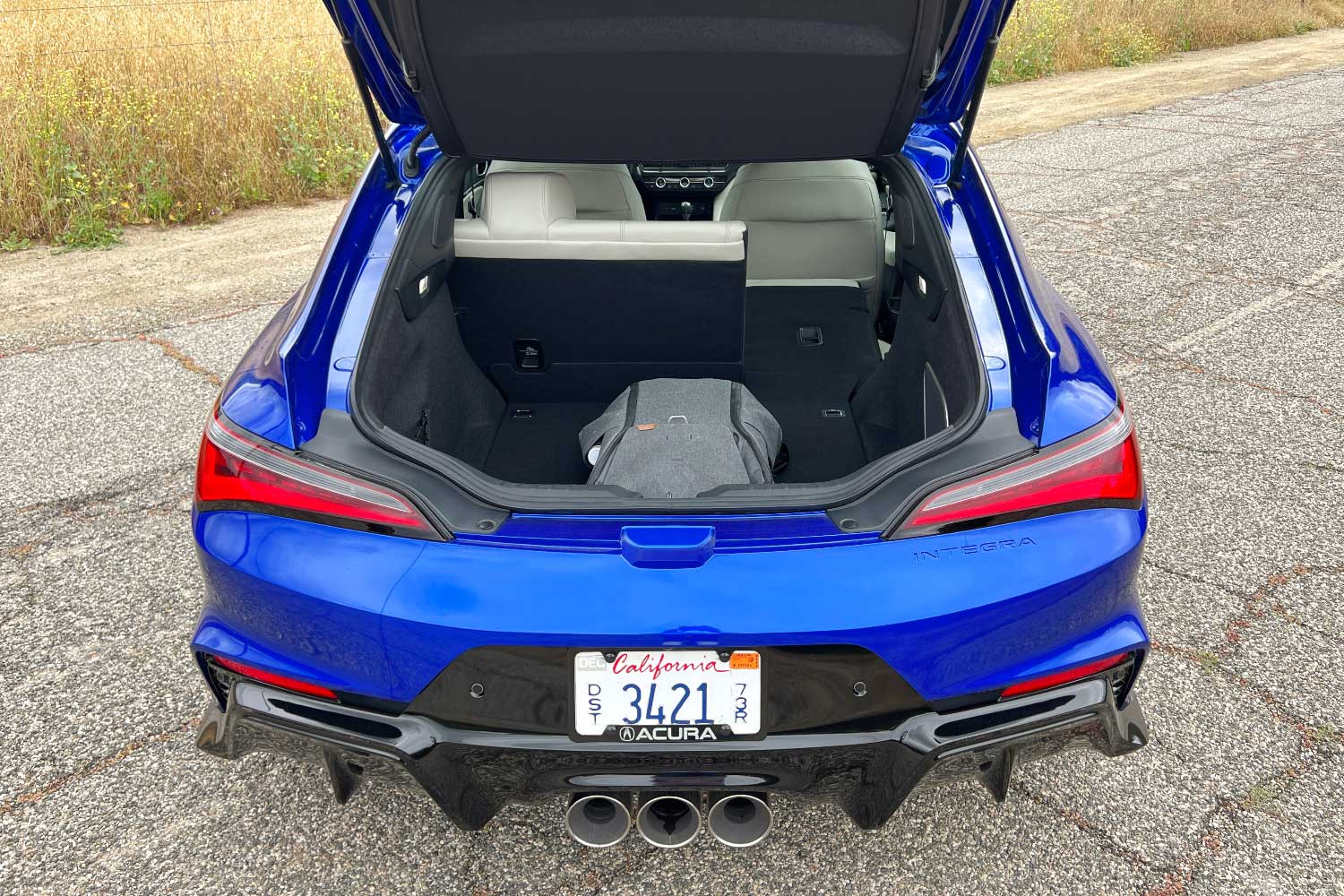 Christian Wardlaw
Christian Wardlaw
Storage space within the cabin is good, and the Integra Type S can hold 24.3 cubic feet of cargo behind the back seat. However, you'll need to remove the cargo cover to make maximum use of that space. The 60/40-split rear seats fold flat to make more room for your stuff, but an Acura spokesperson told me the automaker does not provide a maximum cargo volume number except for its SUVs. So, I'll state the obvious and guess you can double the number above if you pack the car to the roof and the front seatbacks.
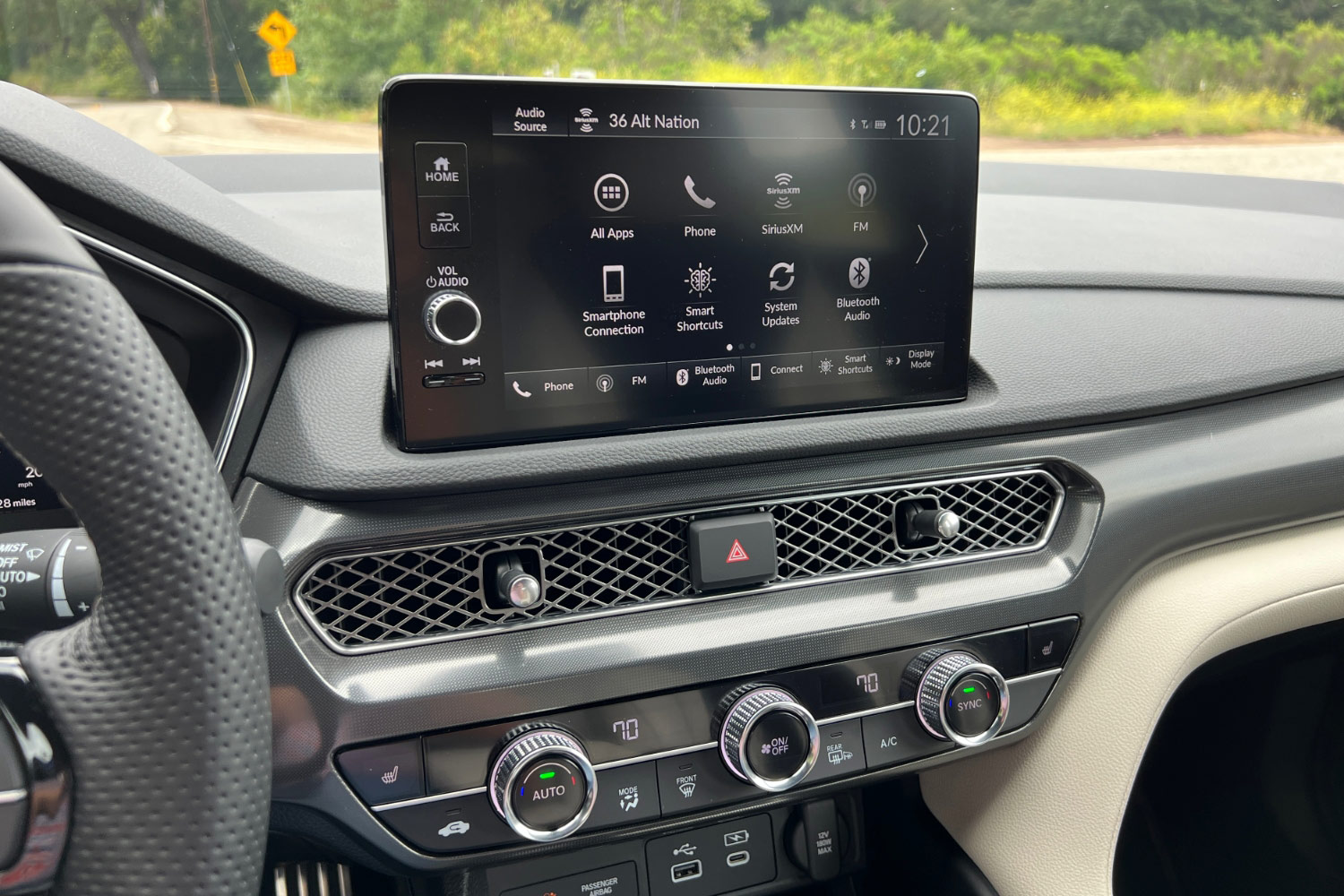 Christian Wardlaw
Christian Wardlaw
Taking the Type S tech on a Test Drive
Every 2024 Acura Integra Type S has a 10.2-inch digital instrumentation panel, and while you can customize the data shown on it, the graphics are not as advanced as you might find in some of this car's rivals.
Acura pairs the digital gauges with a 9.0-inch touchscreen infotainment system. Blessedly, this car does not have the automaker's True Touchpad Interface setup, and the Integra features physical volume, tuning, Home, and Back buttons. At the bottom of the display, you can program several Smart Shortcuts or let the technology assign the slots based on frequently used actions. While the system could be faster to load after you've pushed the engine start button, it is effortless to see and use while driving.
System highlights include Bluetooth, wireless Apple CarPlay and wireless Android Auto compatibility, HD Radio, and SiriusXM satellite radio. Acura doesn't offer a native navigation system for the Integra Type S, so I could not perform a detailed test of the voice recognition capabilities. However, pairing my iPhone 13 Pro to the system was easy and running Apple CarPlay was no problem. Better yet, it was easy to switch between the smartphone platform and the native system, which isn't always the case.
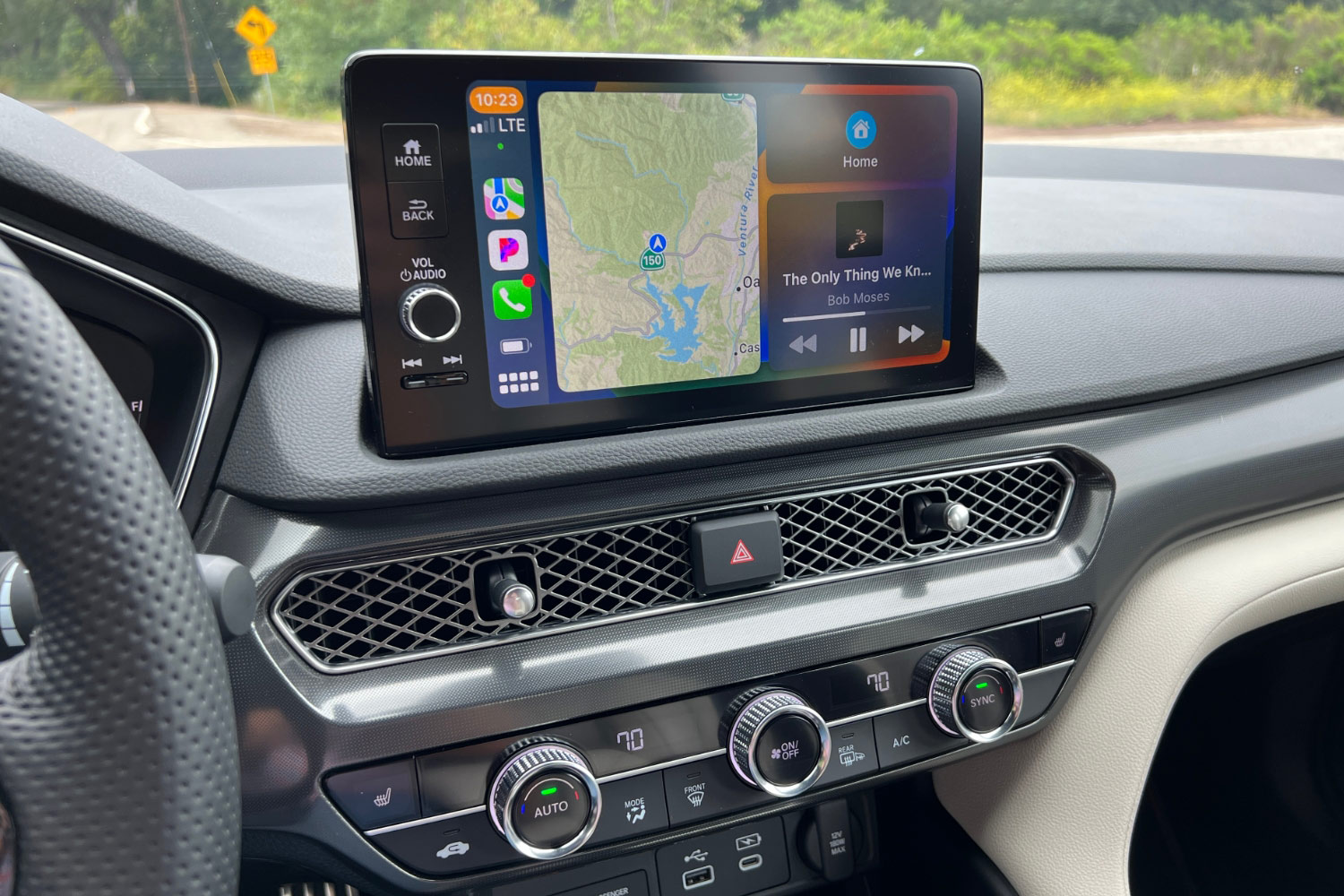 Christian Wardlaw
Christian Wardlaw
I wish I could report the same level of satisfaction with the wireless phone charger. It lives in the tray forward of the shifter, intermittently charging my iPhone seemingly without rhyme or reason. Aside from the car's incessant road noise on the highway, this was the most irritating thing about the Type S.
Acura equips the Integra Type S with a 16-speaker Acura/ELS Studio 3D premium surround-sound system with 530 watts of power. I thought it should have performed better than it did. While streaming Pandora through my phone, it did not sound good. Using Apple Music produced richer sound quality, and listening to SiriusXM sounded the best. But at no time was I wowed.
In addition, the Type S has a standard 5.3-inch head-up display, and drivers can select what information appears here. The test vehicle showed travel speed, road-sign information, and safety feature status.
Acura bundles the car's safety features under the AcuraWatch umbrella. However, there are a few modifications because the Integra Type S comes only with a manual transmission. For example, the adaptive cruise control is missing low-speed follow and Traffic Jam Assist functions. Acura also says the automatic emergency braking system reduces vehicle speed before a collision, suggesting that the tech cannot bring the car to a complete stop.
In any case, AcuraWatch comprehensively equips the Integra Type S with the expected advanced driving assistance systems (ADAS), plus 10 airbags, a seatbelt reminder system, and a rear-seat reminder system.
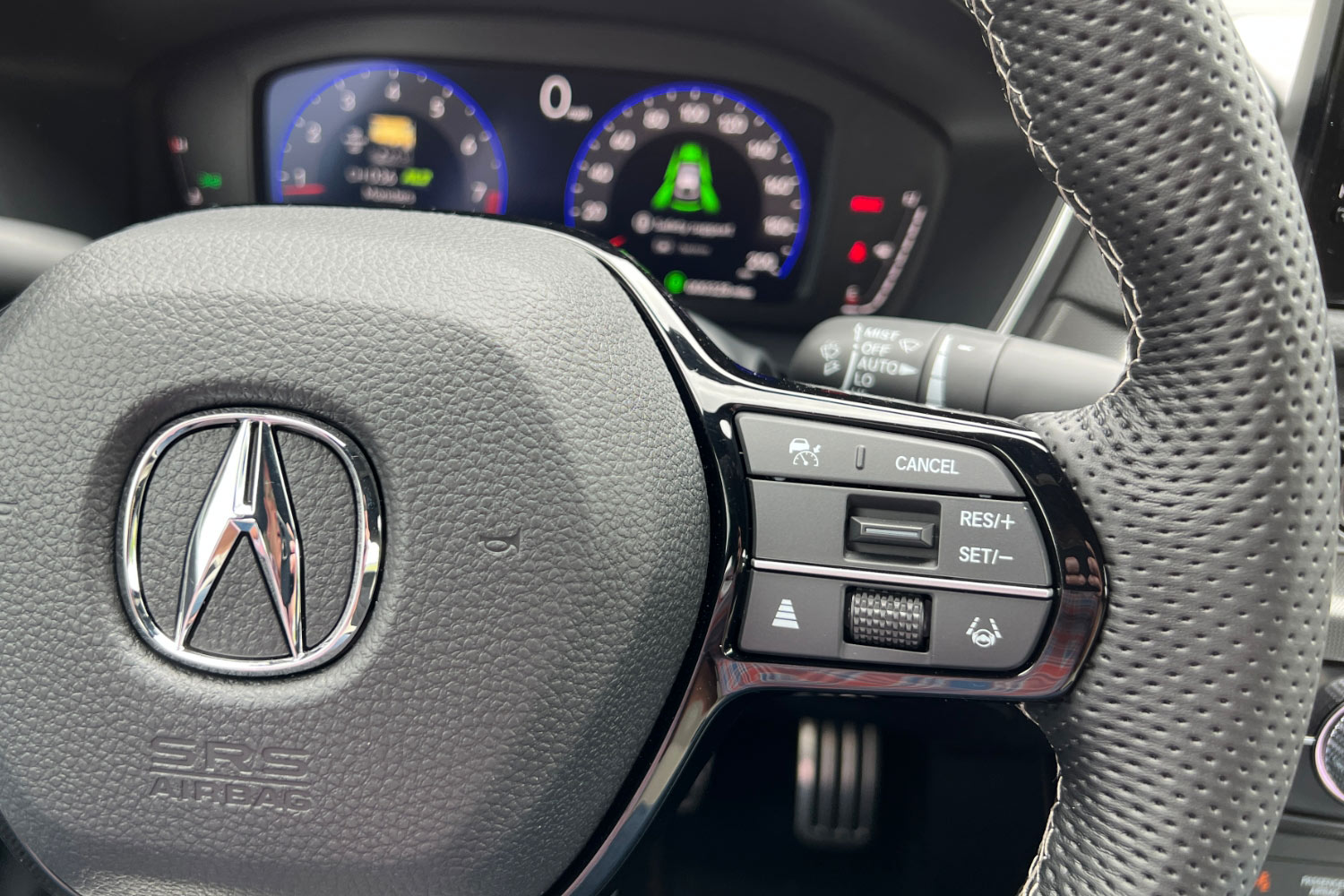 Christian Wardlaw
Christian Wardlaw
I evaluated the ADAS technology on California's Highway 101 while traveling south between Buellton and Santa Barbara. It performed as expected based on other evaluations of AcuraWatch. Namely, the braking can feel slightly uneven when other vehicles cut into the gap ahead, exit and entrance ramps can cause uncertainty in the lane-centering assist system's performance, and the Integra conveys lane-departure warnings with a steering wheel wobble instead of my preferred wheel rim vibration. In other words, the ADAS doesn't feel as transparent and sophisticated in its operation as the tech from some of Acura's rivals.
However, AcuraWatch successfully ignored a highway cleanup crew parked next to the freeway's white lane marker. This was a massive truck with a giant metal sign on the back of it. The truck was inside a gentle right-hand curve in the freeway, however, so this situation might have played out differently in a gentle left-hand curve that would have momentarily placed the truck right in front of the car.
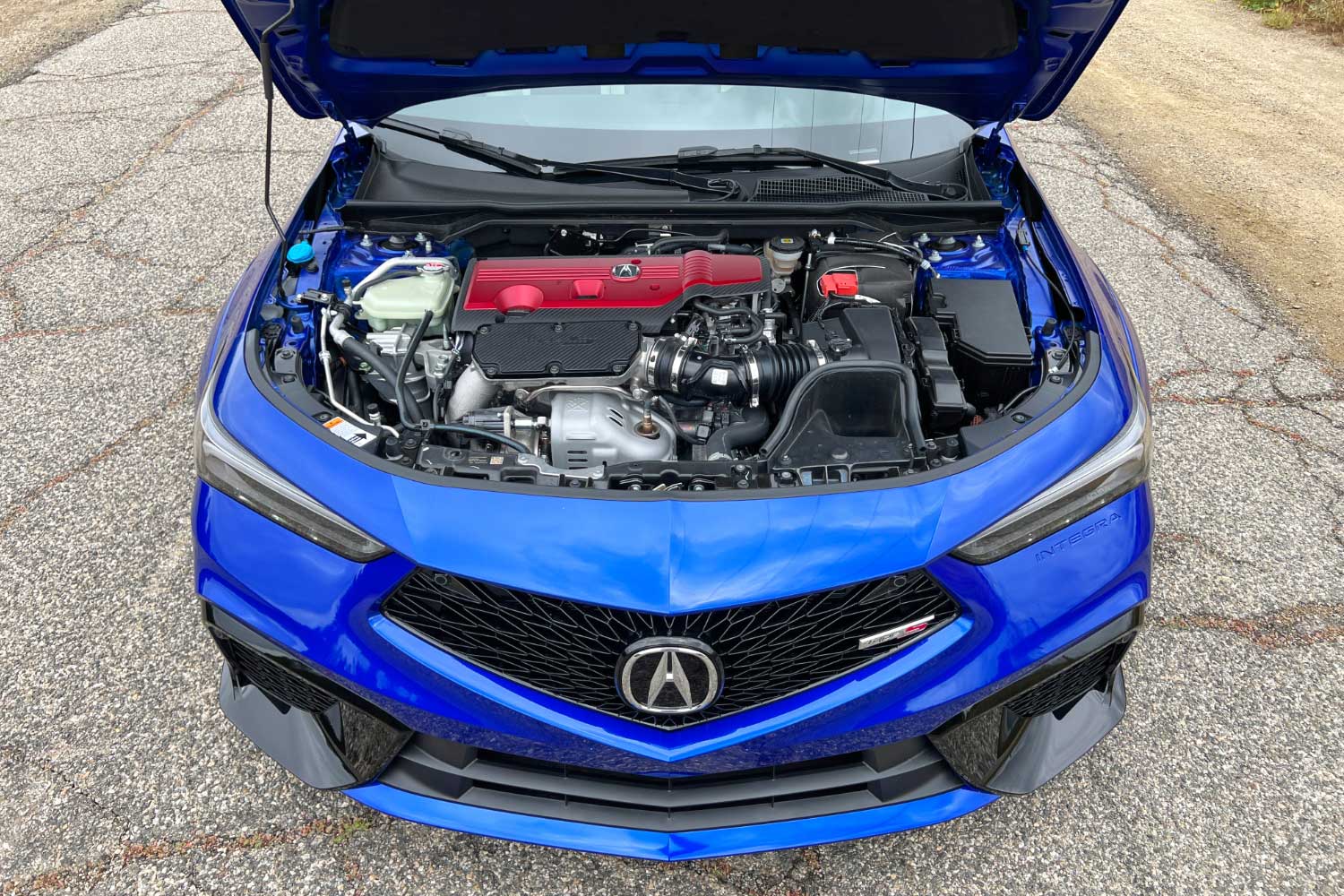 Christian Wardlaw
Christian Wardlaw
The Integra Type S Is Built for Speed
Acura insists the Integra Type S is more than just a more civilized Honda Civic Type R, and the differences between the Civic hatchback and Integra are more than skin deep. Nevertheless, the bloodlines are apparent, starting with the turbocharged and intercooled 2.0-liter four-cylinder engine. The Acura makes 320 horsepower at 6,500 rpm, five more than in the Honda. But torque output matches exactly, with 310 lb-ft between 2,600 and 4,000 rpm.
A six-speed manual transmission is the only one available, and it features a rev-matching function for smoother downshifts. Acura says it employs a lightweight flywheel to improve engine response, and a helical-type mechanical limited-slip front differential (LSD) minimizes wheel spin and equalizes the speed of the front drive wheels. Acura says the LSD makes it possible to accelerate hard on uneven pavement surfaces and out of corners and curves without painting black stripes on the road.
For the best performance, Acura recommends 93-octane gasoline. According to official EPA fuel economy estimates, the Integra Type S should get 24 mpg, giving the car a range of almost 300 miles. That's not much, so plan to stop at gas stations frequently. Over approximately 170 miles of driving in widely variable conditions, the test vehicle returned 21.7 mpg.
A standard Integrated Dynamics Control system provides Comfort, Sport, Sport+, and configurable Individual driving modes. These alter the car's powertrain response, suspension tuning, steering feel, active exhaust system, Active Sound Control, and digital instrumentation illumination. I sampled all four and preferred Individual the majority of the time.
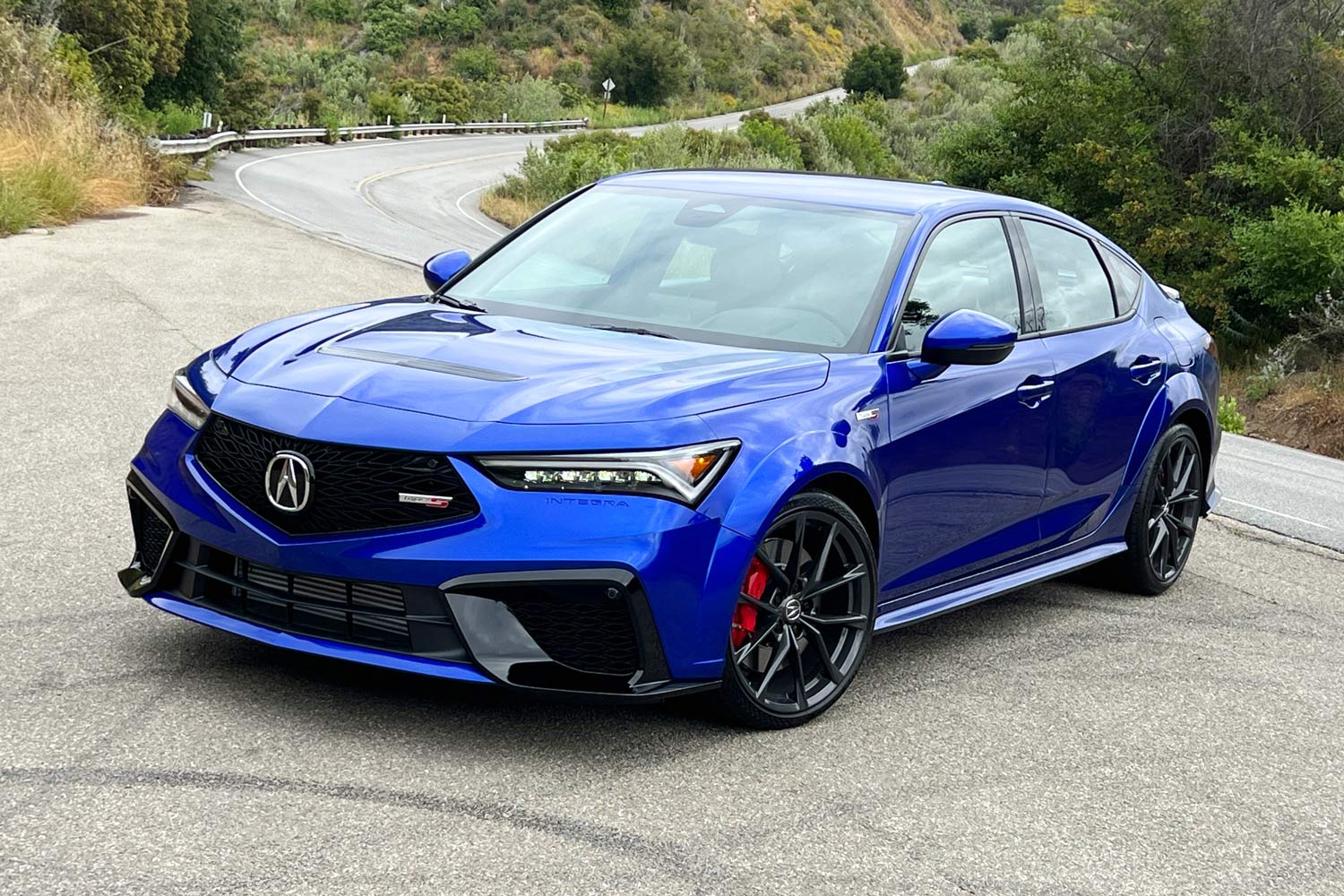 Christian Wardlaw
Christian Wardlaw
Acura swaps out the standard Integra's MacPherson strut front suspension for a dual-axis strut design to reduce the likelihood of torque steer, and it works brilliantly. It pairs with a multilink rear suspension, thicker front and rear stabilizer bars, and an adaptive damping suspension with softer tuning than you'll find in the Civic Type R.
The standard 19-inch wheels are larger and wider than what Acura bolts to the Integra A-Spec, yet they're lighter. In addition, Acura wraps them in size 265/30 Michelin Pilot Sport 4S summer performance tires with a tread design specific to the Integra Type S. With the car's 3.5-inch increase in front track, 1.9-inch wider rear track, 1.1-inch reduction in ground clearance, and lack of a power sunroof, the sticky rubber makes best use of the Type S's broader footprint and lower center of gravity.
Acura says the Type S has upgraded dual-pinion variable-ratio steering with software-based enhancements to improve feel and response, and the company claims it takes just 2.11 turns to spin the steering wheel lock to lock. Larger, thicker front and rear disc brakes consistently haul the 3,219-pound Integra Type S down from speed. Up front, you'll find 13.8-inch two-piece ventilated discs clamped by Brembo four-piston calipers, while the rear axle wears 12-inch solid discs.
To evaluate the 2024 Integra Type S, Acura put me on roads I know well, wriggling across some of the most scenic regions of Santa Barbara and Ventura counties. But the comparatively unfamiliar and technical Armour Ranch Road east of Solvang sold me on the Type S.
Narrow, without a shoulder, and popularly traveled by local ranchers in full-size pickups, this short but sweet stretch of blacktop demands intense driver focus. There is little margin for error as it winds, twists, bends, rises, and dips to culminate in a westbound straightaway that drives like a Six Flags roller coaster. In spots, the pavement is glass smooth. In others, it is a patched mess. Armour Ranch Road separates the great cars from the pack because unexpected vehicle responses or behavior in such an environment can instantly fracture a driver's trust. The Integra Type S excelled on it.
Armour Ranch Road made me wish for slightly sharper and more precise steering that felt more alive in my hands. But, considering the Integra Type S's front-wheel-drive layout and 62:38 front-to-rear weight distribution, its driving character proved that it belongs high on any driving enthusiast's shopping list.
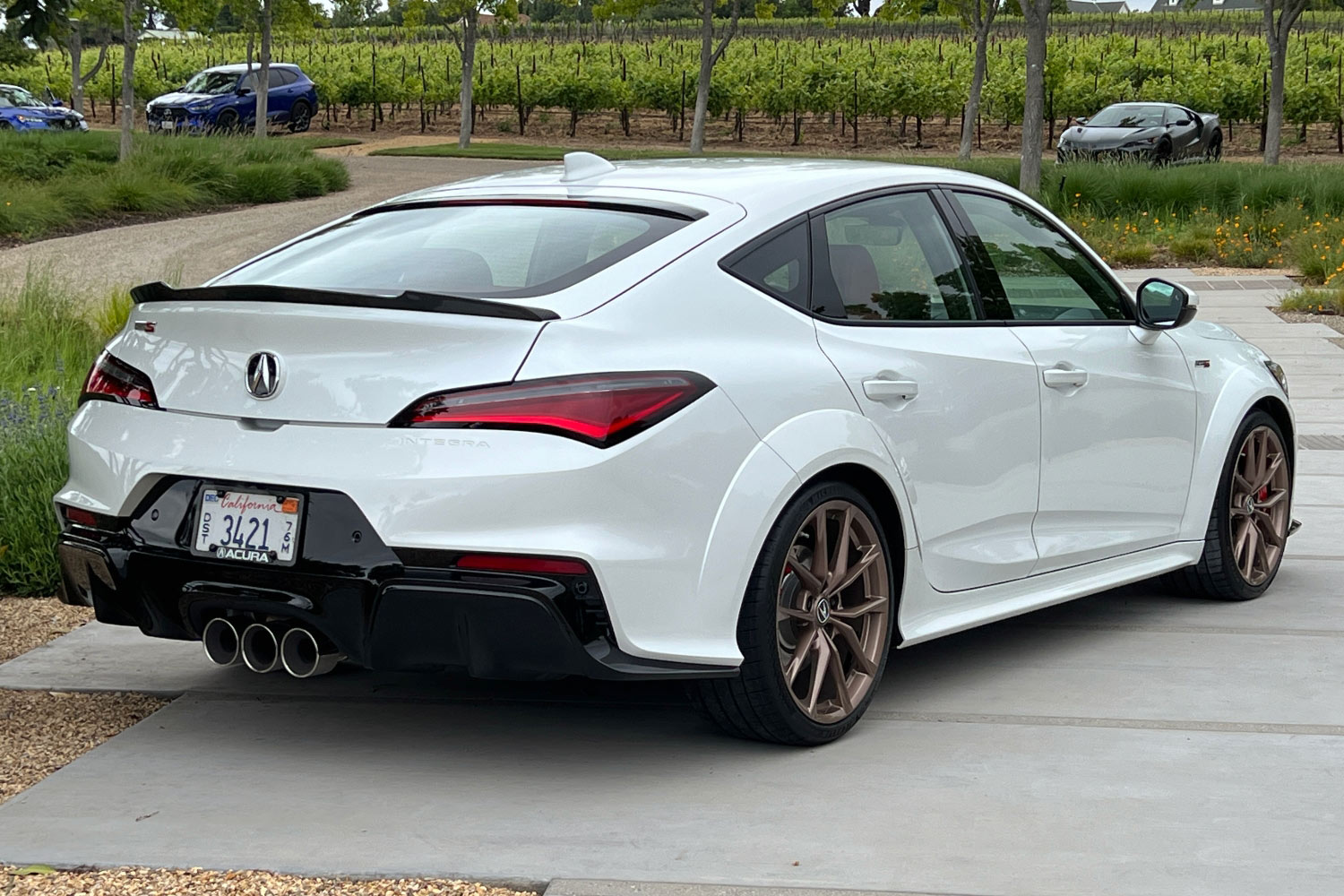 Christian Wardlaw
Christian Wardlaw
Following a fun morning, I subjected the Integra Type S to daily-driving situations, with a freeway slog and some errand-running in Santa Barbara.
When driving in city traffic, the Type S's clutch proved easy to operate for smooth, clean, effortless launches. With the car in Comfort mode, it feels docile in urban environments, and in this driving mode Acura muffles the active exhaust system's snap, crackle, and pop. Parking is a little dicey due to the low front splitter and lack of a forward camera view. The car's low stance means you must take care on steep driveway aprons and speed humps. Otherwise, the Integra Type S is an agreeable daily driver.
Unfortunately, if you spend lots of time driving on the freeway, you'll find the Integra Type S is loud enough that you'll need to raise your voice to be heard clearly by your passengers. I suspect the road noise entering the cabin also dents the surround-sound audio system's performance. The cacophony gets tiring after a while.
Still, even if you drive the Integra Type S primarily in Comfort mode, it remains effortlessly fast and a joy to drive without beating you up like a Civic Type R can. Ultimately, that is the mission of this Acura, and it succeeds.
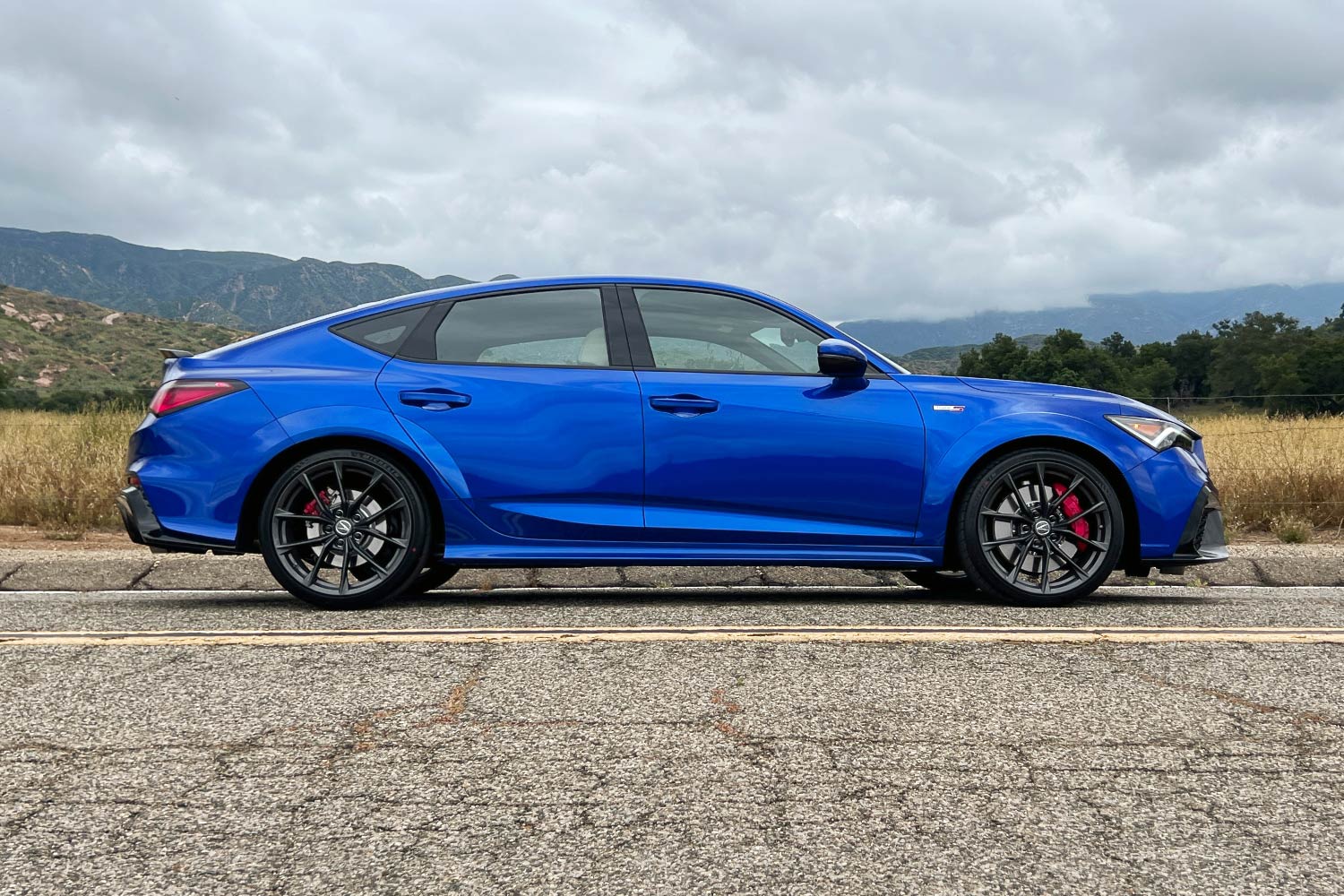 Christian Wardlaw
Christian Wardlaw
Is the 2024 Acura Integra Type S a Good Car?
The point of the 2024 Acura Integra Type S is to supply rapid acceleration and thrilling handling in a practical package without turning the car into an unbearable daily driver. From that perspective, the Acura Integra Type S is more than a good car. I think it is a great car, and I would buy one myself.
However, I think Acura is overreaching on price. With the destination charge, the Integra Type S should squeak under the $50,000 mark in the base specification. Above that price, buyers might expect higher quality materials, more standard features, greater technological sophistication, and a quieter highway ride than the Type S delivers. All-wheel drive might also be expected.
I adore small, speedy, and stealthy cars. The Integra Type S is relentlessly fun to drive hard and fast. It's subdued enough in appearance and sound that I don't feel like I'm having a mid-life crisis while driving it. It also offers enough room for my family and has the utility of a small SUV.
Integra fans revere the legendary third-generation Integra Type R, but the new 2024 Integra Type S represents a new high-water mark for Acura sports sedan performance.
Written by humans.
Edited by humans.
 Christian Wardlaw
Christian WardlawMy first word was “car.” That’s what I’m told, anyway. For as long as I can remember, I’ve been obsessed with them. The design. The engineering. The performance. And the purpose. I’m a car enthusiast who loves to drive, but I’m also most interested in the cars, trucks, and SUVs that people actually buy. Anybody can tell you that a sports car is fast. What you need to know is whether or not you should buy that new SUV, and why. My life purpose is to help you make that decision.
Related articles
View more related articles